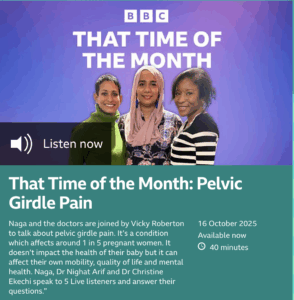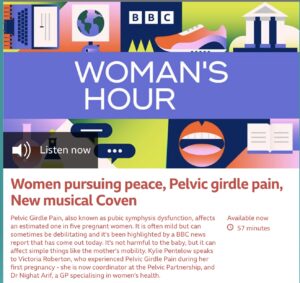The last month has marked a significant milestone in raising awareness of pregnancy-related pelvic girdle pain (PGP), with widespread BBC coverage sparking an overwhelming response from women across the UK who have experienced the condition.

The response was overwhelming. Radio 5 Live’s social media was flooded with comments from women sharing their own experiences. Radio 5 Live’s Facebook reel from the show has received over 80,000 views, with many women commenting to share their stories of pain, frustration, and the struggle to access appropriate treatment.
Today, BBC News published a feature article titled ‘I could hardly walk’ – the issue that affects one in five mums’. The article features our volunteer Rebecca Middleton’s powerful story of spending three months in a wheelchair during her first pregnancy, and how proper understanding and treatment during her second pregnancy meant she made a full recovery within just two months postpartum.
The momentum continued with BBC Radio 4’s Woman’s Hour discussing the topic with Victoria and Dr Nighat this morning, bringing this crucial women’s health issue to an even wider audience.
The outpouring of experiences on social media has been both heartbreaking and validating. We have collated comments from women who felt compelled to share their stories after seeing the coverage. Their voices paint a stark picture of a healthcare system that too often fails to recognise, diagnose, and treat PGP appropriately.
Many women described being dismissed by healthcare professionals:
“I’m currently pregnant with my second and I’m agony! The physio told me it was all in my head as I had suffered with it in my first pregnancy!”
“I went to the hospital physio they said it’s just stress and in my head. I’m now 12 weeks postpartum and I still feel it in my thighs.”
Despite research showing PGP is a mechanical joint problem requiring hands-on treatment, many women were told their pain was psychological or simply “normal pregnancy symptoms.”
The descriptions of pain were overwhelming:
“I suffered all of these symptoms. The pain is debilitating. Honestly the worst I ever experienced. I couldn’t move, lifting a leg to get dressed was awful, sitting down on the loo. I had to walk 200 metres to get to my midwife appointments it literally took me 20min to get there.”
“I had this terribly in my first pregnancy from about 20 weeks gestation, I was unable to walk more than a few metres and ended up housebound. I couldn’t go to work in my job as a surgeon because I couldn’t stand long enough to do the operations without severe pain that would make me faint.”
“Debilitating pain that was worse than labour. It made every task near impossible.”
Women described being unable to turn over in bed, walk up the stairs, get dressed, or care for their babies.
A recurring frustration was the lack of appropriate treatment:
“All the NHS do is give you a package with a belt and a page of exercises that didn’t help. Physio would only consult me over the phone and it was impossible to describe it over the phone.”
“You get zero help on the NHS for it which is wrong. I had to do serious research and discovered the treatment is manual therapy.”
Many women reported being offered only telephone consultations or exercise sheets, when they needed hands-on manual therapy to address the underlying joint dysfunction.
Perhaps most concerning were comments from women still suffering years after giving birth:
“I still have pgp now and my kids are 10 and 5”
“4 years later I’ve still got PGP”
“I have just had Sacroiliac joint fusion surgery, nearly 25 years after suffering pgp with my first pregnancy. I have had lower back and hip pain for years and been dismissed by many health professionals.”
These experiences highlight why the Pelvic Partnership exists – because too many women have been told “it will get better as soon as you have the baby” only to find this isn’t the case without proper treatment.
The most positive thing to come out of all the flurry of media activity is the emphasis on the core message that PGP is treatable. Amongst all the frustration, there were hopeful stories from women who had accessed effective treatment:
“I pushed to see the NHS pelvic team where I had acupuncture every week from 30 weeks pregnant and was given some exercises. I also invested in a couple of osteopath appointments too. It never went away but it eased it.”
“Once I had some manual therapy that targeted the right areas for me, I felt a huge difference in my pain – much better”
“Daily swimming really helped me. As did wearing a support belt.”
These stories demonstrate what we know to be true: PGP is a treatable condition when women receive proper assessment and hands-on manual therapy from experienced physiotherapists, osteopaths, or chiropractors.
One surgeon who experienced severe PGP wrote:
“Despite being a medical professional I had very little knowledge of the problem and that was also my experience with most of the doctors/midwives I encountered who were very dismissive. The Pelvic Partnership were a great resource, all midwives should have training from them so they can appropriately signpost women to the right treatments.”

One commenter articulated what many were thinking:
“I suspect the solution to all of humanity’s medical woes lies in science studying the female body. We are thousands of years behind where we should be with illnesses, diseases and afflictions without cures.”
“I am convinced that if my husband had had this, he would have been diagnosed and treated years ago.”
If you’re experiencing pelvic pain during or after pregnancy, remember that PGP is a common and treatable condition. Here’s what to do:
You should walk out of each treatment feeling some improvement in either pain or function, and preferably both.
This week’s BBC coverage represents a significant moment in raising awareness of PGP. The hundreds of women who have shared their experiences have broken the silence around this condition and demonstrated the urgent need for better training, earlier diagnosis, and appropriate treatment.
If you have experienced PGP, whether during pregnancy or years afterwards, please know that you’re not alone and that help is available. The Pelvic Partnership is here to support you.
We want to extend our heartfelt thanks to BBC Radio 5 Live, BBC News, and BBC Radio 4’s Woman’s Hour for giving this issue the platform it deserves. To every woman who has shared their story this week – your voices matter, and together we are making a difference.
If you’ve been affected by this coverage and would like to share your story or seek support, please don’t hesitate to get in touch.
Like many charities, the Pelvic Partnership relies on donations and grants and in the current financial climate this is becoming increasingly challenging.
We provide all our support for free to make sure it is accessible to anyone who needs it. We currently only have enough funding to keep running our services for another 4 months.
You can help by donating, every little helps, or by signing up for a regular donation and becoming a member. You could also hold your own fundraiser or sponsored event, see Get Involved for more information or get in touch with us.
We are grateful for any help you can give us, thank you.
Resources
Unfortunately we are in a position where, without an increase in donations, we will only be able to continue to operate for another 4 months.
Donate today to help us help others with pregnancy-related pelvic girdle pain (PGP)